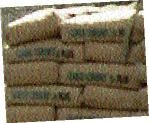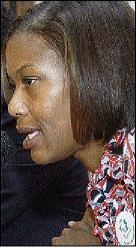JMA sides with cement importers
Published: Wednesday | May 27, 2009

Omar Azan, president of the JMA. - File
The Jamaica Manufacturers' Association is expected to tell Prime Minister Bruce Golding that it is siding with importers on the cement issue, a decision that could pit the association against its manufacturing member Caribbean Cement Company Limited (CCC).
Carib Cement in the meantime is still hoping for victory when Industry Minis-ter Karl Samuda weighs the positions.
The JMA board, at a closed door meeting last week, came down in support of a one-year extension on the Common External Tariff (CET) waiver that would allow importers of the commodity to compete with monopoly producer CCC.
JMA president Omar Azan was unwilling to speak on the outcome of the meeting, though sources say he plans to go further by establishing a working group to recommend a more permanent resolution to the ongoing tug of war over the cement market.
The working group's composition is yet to be finalised, said our source.
"I will not comment on the matter at this time," Azan told Wednesday Business.
"We are working out some stuff with the minister right now and as soon as that is sorted out, I will be able to speak to you," referring to Industry Minister Karl Samuda who will sign off on the 15 per cent CET waiver at the expiration of the current waiver in September, which allows importers 25 per cent of the cement market.
Caribbean Cement has asked that Samuda deny the importers.
At last week's JMA meeting, sources say submissions were made by Trinidad-owned Carib Cement, Jamaica's Tank-Weld Metals which wants to enter the business of cement bagging and is already distributing imports, and the Incorporated Masterbuilders Association of Jamaica (IMAJ).
Prime Minister Golding waded into the cement quarrel and sought JMA's input after a meeting between Samuda and cement importers, where tempers reportedly flared over the lobby by the CCC for a reimposition of duties.
Last week's meeting at the JMA was said to be similarly volatile.
It got so heated that CCC Marketing Manager Alice Hyde at one point rose to apologise for "letting the country down" in 2006, but this, she said, was due to the fact that the issue was constantly articulated at the meeting.
Indeed, it was the 550 tonnes of faulty cement that the company released on the market in 2004/05, creating the crisis, that eventually opened the door to the cement waiver for importers to fill the gap in supply thatwas subsequently created.
Should the Government accept the JMA recommendation to keep the waiver in place, it means that CCC will continue to control about 75 per cent of the market, while importers will maintain the other 25 per cent until September 2010.
Last year, Carib Cement was able to satisfy 84 per cent of the market, while the rest was covered by imports.
But Hyde, who along with Adrian Simmonds represented the monopoly producers at the meeting, said such a move would not be good for her company, arguing that 85 per cent of the market was not enough for CCC to earn an adequate return on investment even with their new export drive.
"We are still hoping that the Government will make the right decision," she said.
"I don't see how they can do anything else with all that information that is available to them."
Caribbean Cement has in the past two years invested US$177 million — the latest figure quoted by Hyde — on the expansion of the Rockfort plant, growing capacity from one million tonnes to 1.8 million tonnes with the installation of a 110-tonne per hour vertical roller mill.
Grow exports

Last year, Carib Cement exported 28,463 tonnes of cement, and though the attendant revenue was not disclosed, CCC has said it plans to grow exports to 15 per cent of group revenues.
"While I do recognise that there would be some loss of confidence, we have since invested over US$177 million to ensure that the company is in a position to move forward and supply the demands for cement for many, many years to come," Hyde said.
But Tank-Weld chief executive Bruce Bicknell counters that the re-imposition of the 15 per cent CET would shut down his company's cement business and jeopardise the investment at Port Rio Bueno in Trelawny.
That, he said, would put some 1,200 jobs at risk.
Bicknell declined to divulge details of the JMA meeting, but told Wednesday Business that the company made the investment on the basis that no government would take the risk of seeking to return the country to a single supplier, in the wake of the devastating impact of the cement crisis on the economy.
"We are contending that there is a balance to be struck whereby 75 per cent market share is a more than adequate base for CCC to build on its successful export drive, while the remainder will be made available for other credible sources of cement," he said.
"This, we feel, is a fair balance that will preserve a level of competition, choice, and support for all local investments that have been made, while putting Jamaica on a safer footing in respect of supplies of cement."
Raymond Cooper, IMAJ president, who represents building and civil engineering firms, specialist contractors, as well as associated organisations, supported the argument of the local importers.
He said his membership, which represents the major users of cement, would not be in support of returning to a monopolistic environment for cement, and that competition in the market had been beneficial to construction firms.
mark.titus@gleanerjm.com

Carib Cement marketing manager Alice Hyde. - File


















